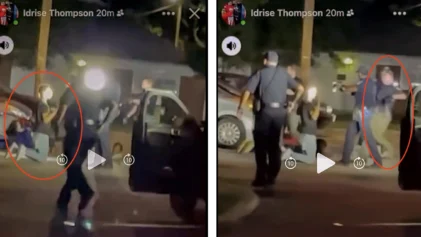In the side-eye seen round the world, a Black professor was visibly baffled by a conservative author’s arguments during a House Judiciary Oversight Committee hearing on U.S. policing last week.
Essayist Heather MacDonald, a fellow at the Manhattan Institute for Policy Research, raised eyebrows on Thursday when she characterized instances of deadly police violence against African-Americans as a non-issue, arguing that the idea of Black men being gunned down by cops at disproportionate rates is a racist, divisive narrative pushed by the media.

Professor Phillip Goff (left) decried what he called “junk science” spewed by conservative commentator and author Heather MacDonald (right) on racial bias in policing. (Photo: YouTube / video screenshot)
“We’re told that we’re living through an epidemic of racially biased police shootings of Black men. This too is false,” said MacDonald, adding that “the anti-police narrative deflects attention away from solving the real criminal justice problem, which is high rates of Black victimization.”
The suggestion drew a clear objection from John Jay College of Criminal Justice professor Phillip Atiba Goff, president of the Center for Policing Equity, who was seated next to her.
The conservative commentator proceeded to rattle off a number of right-wing talking points and statistics pointing to black-on-black crime, at one point arguing that if the police were biased towards anyone, it was white civilians because they’re killed at higher rates than Blacks.
“There is no government agency more dedicated to the proposition that black lives matter than the police,” she added.
Goff is seen shaking his head throughout MacDonald’s testimony, seemingly in disbelief at what’s being said.
The conservative pundit went on to claim that Blacks actually support heavy-handed police tactics, saying, “A 2015 Quinnipiac poll found that 61 percent of black voters in New York City wanted the police to issue summons or make arrests in their neighborhood for quality of life offenses, compared to 59 percent of white voters.”
When it’s finally his turn to speak, the self-described “professional nerd” debunks what he called “junk science” spewed by MacDonald, beginning with her claim that a drop in urban crime was the direct result of broken windows policing.
“The fall of crime over the course of the last quarter century is just not abjectly in response to police behavior alone,” Goff started, guiding the committee to a book by Pat Sharkey which he argued “identifies quite clearly that community-based anti-violence work is a large and underappreciated component of reduction in crime.”
Goff proceeded to blast MacDonald’s use of the Quinnipiac survey as evidence that those in the Black community wanted and actually “enjoyed” broken windows policing.
“If memory serves me correctly, that exact same Quinnipiac poll shows that Black people were concerned about racial bias within law enforcement — a trend that has escalated over a period of time since 2015,” he continued. “To suggest Black people enjoyed the treatment in New York or any place else of broken windows policing, is what scholars … refer to as selective hearing; hearing only what is convenient to an ideological narrative and not the fullness of what those communities are calling for, which is safety and justice at the same time.”
The professor went on to specifically debunk a central claim MacDonald cited from the study, saying, “Last, in terms of clarification, a study and proceedings in the National Academies of Sciences was just cited, and I have to say, first of all, no, that’s not what it said.
“Most importantly, the authors of that study have recently acknowledged to the rest of the scientific community, to some members of the scientific community, that their central causal claim is unsupported by the data and factually wrong.”
Goff apologized to the committee for deviating off course, but made it clear he wanted to no part anything “that becomes a laundromat for junk science.”
Watch more in the video below.


